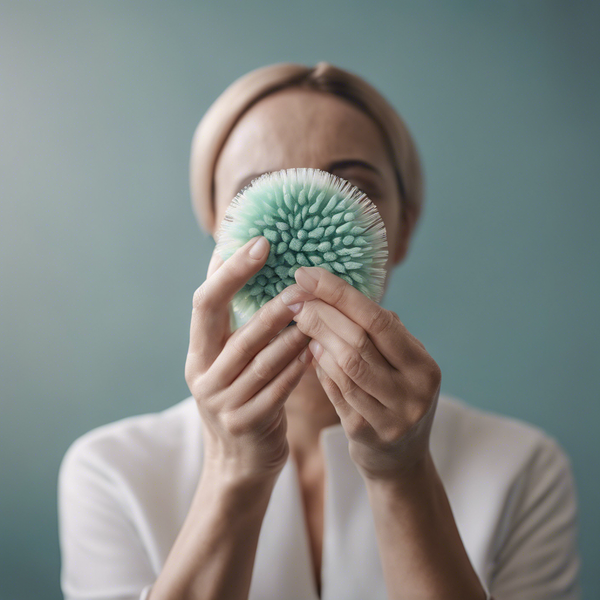Dandruff is a common scalp condition that affects nearly half the population. It can be persistent and frustrating, but there are numerous ways to tackle it. One such method that has gained popularity is the use of a scalp scrubber. This article will delve into the effectiveness of scalp scrubbers in managing dandruff and how they can be incorporated into your hair care routine.
Key Takeaways:
- Scalp scrubbers can help reduce dandruff by exfoliating dead skin cells and reducing scalp buildup.
- Regular use of a scalp scrubber can improve scalp health and potentially aid in better absorption of hair products.
- It's important to choose the right type of scalp scrubber and use it correctly to avoid irritation.
What is Dandruff and Why Does it Occur?
Dandruff is a condition characterized by the flaking of the scalp's skin. It can be caused by a variety of factors, including dry skin, sensitivity to hair products, and the growth of a yeast-like fungus called Malassezia. While dandruff is not contagious or serious, it can be embarrassing and sometimes difficult to treat.
The presence of dandruff indicates that the scalp's natural shedding process is disrupted, leading to the visible flakes that many try to avoid. Understanding the root cause of dandruff is crucial in selecting the right treatment method, including whether a scalp scrubber could be beneficial.
The Role of Scalp Scrubbers in Dandruff Management
Scalp scrubbers are tools designed to help exfoliate the scalp, removing dead skin cells and product buildup that can contribute to dandruff. They come in various forms, from manual brushes to silicone pads and even electric massagers. The primary function of these tools is to cleanse the scalp more effectively than shampooing alone.
By incorporating a scalp scrubber into your routine, you may be able to reduce the severity of dandruff. The scrubbing action helps to loosen flakes and excess sebum, which can then be washed away more easily. This can create a healthier environment for your scalp and hair, potentially reducing the occurrence of dandruff.
Choosing the Right Scalp Scrubber
When selecting a scalp scrubber, it's important to consider the material and design. A scrubber with soft, flexible bristles can be gentle enough for sensitive scalps, while still providing the necessary exfoliation. Silicone scrubbers are a popular choice due to their durability and ease of cleaning.
It's also important to consider the shape and grip of the scrubber to ensure it's comfortable to use. Some scrubbers are designed to fit snugly in the palm of your hand, while others have handles for an easier reach. The right choice will depend on your personal preference and the specific needs of your scalp.
How to Use a Scalp Scrubber Effectively
To get the most out of a scalp scrubber, it should be used correctly. Start by applying your regular shampoo to your wet hair. Then, gently massage your scalp with the scrubber in a circular motion. This helps to lift and remove dandruff flakes without causing irritation.
It's important not to press too hard, as over-exfoliation can lead to a sensitive scalp and potentially worsen dandruff. After thoroughly scrubbing your scalp, rinse out the shampoo and follow up with a conditioner if desired. Using the scrubber once or twice a week is typically sufficient for most people.
The Benefits of Scalp Exfoliation
Exfoliating the scalp has several benefits beyond just dandruff management. It can improve blood circulation to the scalp, which may promote healthier hair growth. Additionally, it can help hair care products penetrate more effectively, allowing for better nourishment of the hair and scalp.
Regular exfoliation can also prevent the buildup of hair products, oils, and dead skin cells, which can contribute to other scalp issues. By maintaining a clean and healthy scalp, you're laying the foundation for overall hair health.
Potential Risks and Precautions
While scalp scrubbers can be beneficial, there are potential risks if used improperly. Over-exfoliation can lead to scalp irritation, increased oil production, and even hair breakage. It's crucial to use a gentle touch and to not use the scrubber too frequently.
If you have a scalp condition like psoriasis or eczema, consult with a dermatologist before using a scalp scrubber. They can provide guidance on whether this method is suitable for your specific condition and how to use it without causing further irritation.
Scalp Scrubbers vs. Anti-Dandruff Shampoos
Anti-dandruff shampoos are a common treatment for dandruff, often containing active ingredients like zinc pyrithione or selenium sulfide. While these shampoos can be effective, they may not address the physical buildup on the scalp.
Using a scalp scrubber in conjunction with an anti-dandruff shampoo can enhance the effectiveness of the treatment. The scrubber can help remove flakes and buildup, allowing the shampoo's active ingredients to work more efficiently on the scalp.
Natural Remedies and Scalp Scrubbers
For those who prefer natural remedies, a scalp scrubber can still play a role in dandruff management. Natural ingredients like tea tree oil, apple cider vinegar, and coconut oil have properties that may help control dandruff. When used with a scalp scrubber, these remedies can be more effective as the exfoliation allows for better absorption of the natural ingredients.
However, it's important to patch test any natural remedy before applying it to your entire scalp, as some individuals may have sensitivities or allergic reactions to certain ingredients.
Maintaining Scalp Health Long-Term
Incorporating a scalp scrubber into your hair care routine is just one part of maintaining long-term scalp health. It's also important to follow a balanced diet, stay hydrated, and manage stress, as these factors can all impact the health of your scalp and hair.
Additionally, be mindful of the hair products you use and try to avoid those with harsh chemicals that can strip the scalp of its natural oils. Opting for gentle, sulfate-free shampoos and conditioners can also help in keeping your scalp in good condition.
Summary
A scalp scrubber can be a valuable tool in the fight against dandruff. By exfoliating the scalp, it helps to remove dead skin cells and product buildup, creating a healthier environment for hair to grow. When used correctly and in moderation, a scalp scrubber can enhance the effectiveness of dandruff treatments and contribute to overall scalp health. However, it's important to choose the right scrubber, use it gently, and consider any underlying scalp conditions before incorporating it into your routine.
FAQ Section
Q: Can using a scalp scrubber make my dandruff worse? A: If used too aggressively or too frequently, a scalp scrubber can irritate the scalp and potentially worsen dandruff. It's important to use it gently and no more than once or twice a week.
Q: Are scalp scrubbers suitable for all hair types? A: Scalp scrubbers can be used on most hair types, but individuals with very sensitive scalps or certain scalp conditions should consult with a dermatologist first.
Q: How often should I use a scalp scrubber for dandruff? A: Generally, using a scalp scrubber once or twice a week is sufficient. However, the frequency can vary based on individual needs and the severity of dandruff.







